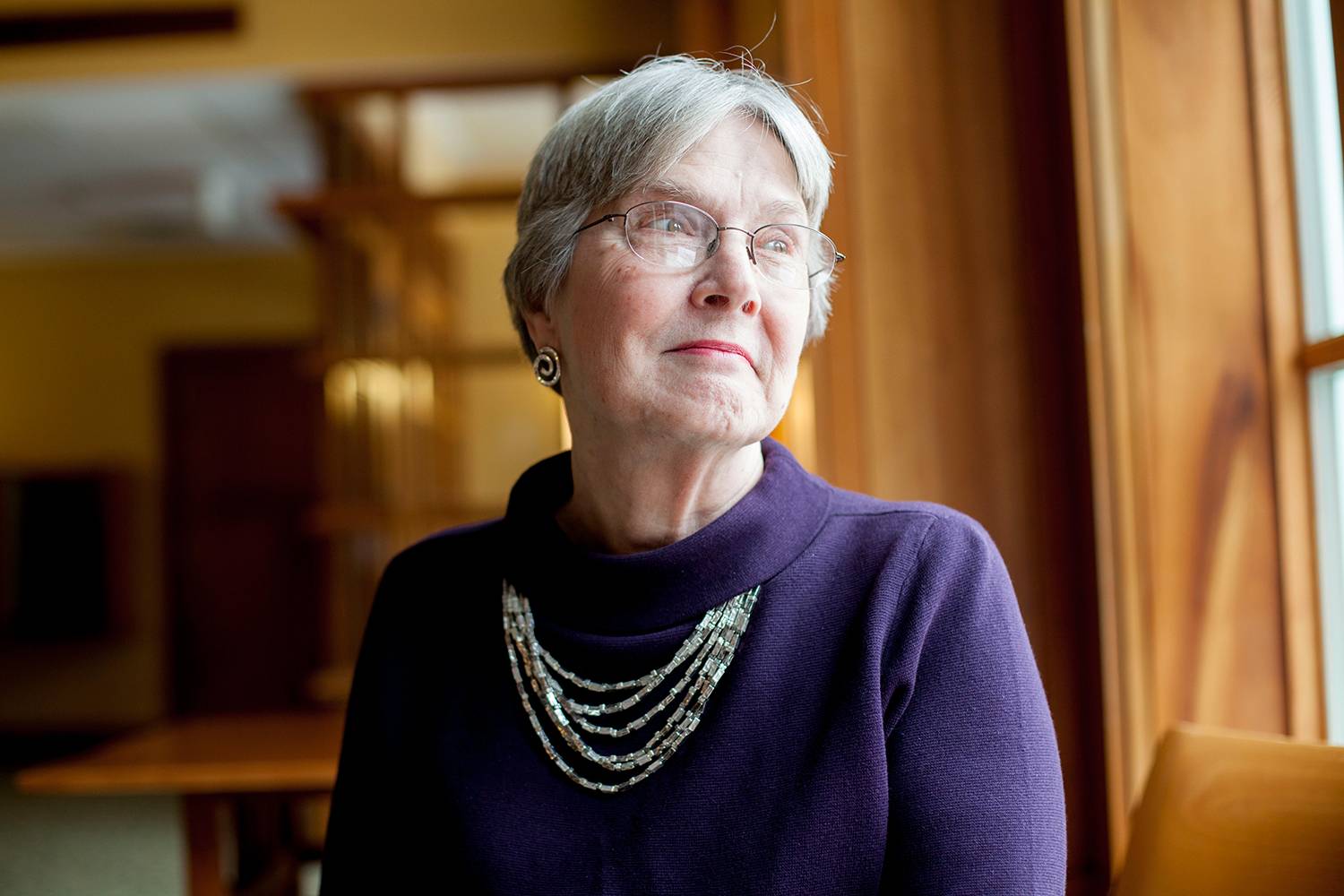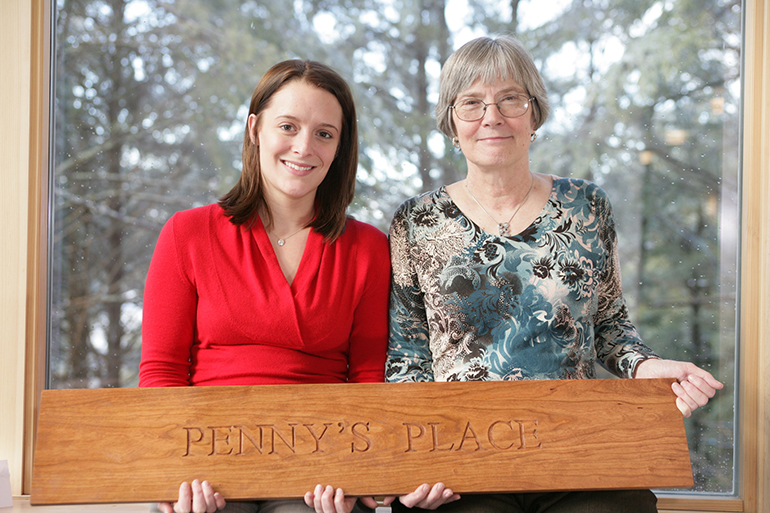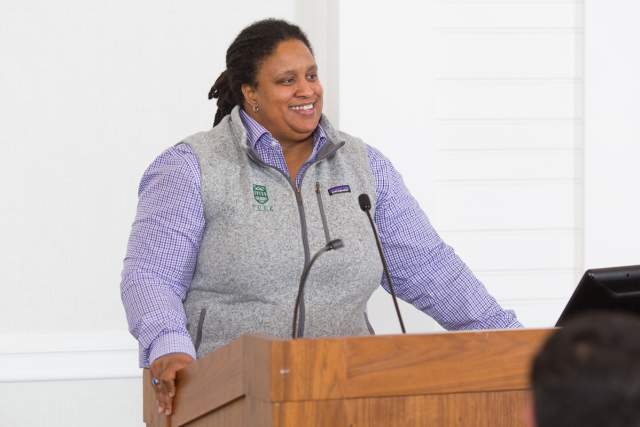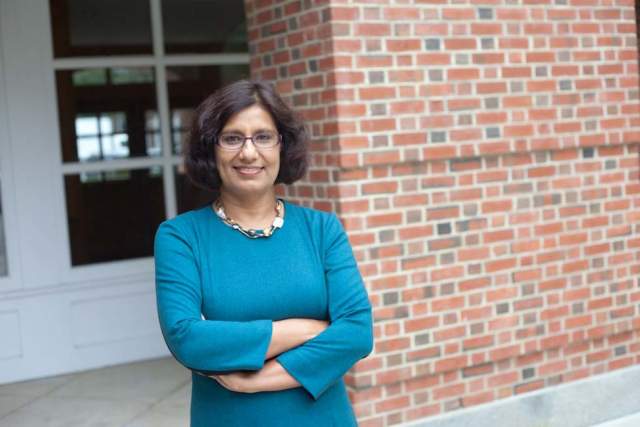Keeper of the Culture
From behind the scenes, Penny Paquette T’76 has played an outsize role in the evolution of Tuck.

Penny Paquette T’76 spent her 33 years at Tuck helping to curate its culture and aid in its development.
In 2010, Dean Paul Danos was looking for a way to expand Tuck’s global presence. Hiring staff members in dozens of countries seemed impractical, and against the spirit of the close-knit Tuck community.
So he dreamed up what would become the Regional Boards—groups of alumni living abroad who wanted to help the school in discrete ways. “My idea was to make these boards directly tied to operations, like admissions, communications, and PR,” he says. The school’s other alumni boards—the overseers and the MBA Advisory Board—had a broad, strategic purview. The Regional Boards would be much different, and Danos knew it would be challenging to coordinate high-powered alumni around the world to accomplish quantifiable objectives. There was only one person who could get this done: Penny Paquette T’76.
“Penny understood the culture and the people well enough to know what they could practically do,” he says. “I just made it up and turned it over to her.”
Paquette, the assistant dean for strategic initiatives, approached the task with her characteristic tact, precision, and attention to detail. She got to know the board members, established a process for engaging with them, and worked with them to advance Tuck’s agenda in the region. In Latin America, for example, Paquette worked with the regional board to choose which countries to focus on, and to get the best applicants from those countries to apply to Tuck. Using each board member’s knowledge of their own local business environments, they came up with a limited set of companies in each country with whom to build relationships.
Penny understood the culture and the people well enough to know what they could practically do, I just made it up and turned it over to her.
On June 30th of this year, after working at Tuck for 33 years, Paquette is retiring. She has played a bigger role in the school and its continuous evolution than she ever expected when she arrived as a first-year student in 1974. Her work has encompassed areas as disparate as international initiatives, strategic planning, institutional research and competitive benchmarking, and building and renovating the campus, among many others. As she looked back recently, she realized why she stayed for so long: she never had time to get bored. And, like most alumni, she loves Tuck fiercely and feels honored to have helped curate its culture and have a say in its development.

Penny with her daughter Devon Paquette T’12.
Paquette, 69, calls Worcester, Mass. her home town, but she didn’t spend much time there. She left as a teenager to attend boarding school, and then Smith College. After getting her B.A. in history, and unsure of what kind of career best suited her, she began working for a consulting firm in Cambridge. When she looked around, she noticed that all the consultants she worked for had MBAs. “I said, OK, I should get one of those,” Paquette says.
She ended up at Tuck because it was a familiar place—her father is a Dartmouth alumnus and her brother-in-law went to Tuck—and because it seemed to her like a place where being a history major wasn’t a severe disadvantage. While other business schools at the time were exclusively using the case method, Tuck was known to be more practical. “I knew that at Tuck, yes, we’d discuss cases, but I’d also learn how to do accounting, do models, calculate ROIs. I knew I’d learn the skills that I needed.”
In some ways, Tuck in 1974 was almost comically different from Tuck today. Paquette was one of 15 women in a class of 135, and “stood out like a sore thumb,” she recalls. Moreover, the school didn’t organize first-year study groups, and the men and women formed groups of their own gender. Still, Paquette threw herself into campus life. She ran (unsuccessfully) for first-year class president, and worked as a research assistant for associate dean Paul Paganucci D’53, T’54. One of her favorite courses was Business Environment, taught by Wayne Broehl, which studied the relationship between business and society. Another high point was Brian Quinn’s Business Policy course (the precursor to the core Strategy course), and its Tycoon game, a simulation where groups of students each run a company in a particular industry and compete with other teams of students.
Tuck fulfilled its promise to give Paquette a high quality business education. And yet, her experience in business school didn’t help her figure out what she wanted to do with her degree. That would come later. In the meantime, Paquette experimented with careers. She worked for Massachusetts General Hospital for six months, then went back to the consulting firm where she worked after college. They didn’t have a consulting job for her, but asked her to establish a human resources department at the firm. She recruited consultants, set up training, specified criteria to get promoted. Like consulting work, it was project-based. “It was fascinating,” she remembers. “I’m not somebody who can do something over and over again. I just get bored.”
In 1984, Paquette got a chance to do something even better. She and her husband had moved back to Hanover, just down the street from Brian Quinn. Paquette was home caring for her infant daughter and Quinn asked her if she wanted to write cases with him. Her answer? “God, yes! Definitely!” For the next five years, they researched, drafted cases, and published articles in Scientific American, MIT Sloan Management Review, and Harvard Business Review. Paquette was a co-author on each. “He didn’t just thank me in the notes,” she says. “He was a very kind and generous person, as well as being incredibly smart.”
Paquette’s next job at Tuck would introduce her to the administrative side of the school. Tuck had agreed to help the International University of Japan (IUJ) start an English-language MBA program on its campus. Quinn was the first dean of the program, and Paquette became the liaison between the two schools. She recruited students, lined up visiting faculty, ran a three-week summer immersion program at Tuck for Japanese students, and helped the students find jobs. But by 1995, IUJ had learned enough that it decided it could run its own MBA program, without Tuck’s help. And because the IUJ paid Paquette’s salary, that meant she was going to be let go.
It was a good time for a transition, because Tuck was welcoming Paul Danos as its new dean. Danos arrived in Hanover with many ideas and initiatives, and wanted to get started on them right away. The problem was, Tuck was a lean organization and didn’t have someone to help Danos implement his plans. “Mado MacDonald, who was the equivalent of the COO at the time, advised me to get someone who really knows the culture and knows everyone here,” Danos says. “I needed someone like that to help me make progress.” Paquette, an alumna who had experience in virtually every department (acquired while working for IUJ), was the perfect fit. Danos hired her as his assistant for special projects.
One of Paquette’s first tasks was to build up Tuck’s administrative structure. It had been so thinly staffed that it was hard for anyone to find the time for new initiatives. So they worked together to create or augment functions such as public relations, IT, communications, facilities, and the centers and initiatives. At the same time, the school was undergoing a strategic review, and Paquette helped Danos organize that effort, convene committees, and articulate the strategy internally and externally. It was a job she would do a few times in her 20-year tenure with Danos.
The strategy work turned out to be good training for her next big project: renovating and building the campus. Because Paquette was intimately familiar with the rationale for these capital improvements, she could segue into planning and construction with confidence. First, Danos wanted to improve Tuck’s technology, so Paquette oversaw the complete overhaul of the third floor of Murdough (a brand new building when she came to Tuck as a student) into the Whittemore Lab. Paquette’s role in this and future construction was, essentially, the end user’s representative—she made sure the final product would serve Tuck best. Paquette attended weekly project meetings with architects and contractors, and was involved in nearly every detail of construction. Every so often, she’d hear something in a meeting that didn’t sound right. One time, a contractor had proposed to put drop-panel ceilings in Whittemore Hall, to make it easier to re-wire the building in the future. “I said, ‘No. When you lie in bed at night, do you look up at a grid or do you have a solid ceiling in your own home? You need to consider that these rooms are somebody’s home for nine months,’” she recalls. She brought that level of scrutiny to every project she touched: including the Bosworth renovation, and the new construction of Whittemore Hall and Achtmeyer/Raether/Pineau-Valencienne. They occupied her time for more than 10 years.
She works incredibly hard, is very talented, and very committed to her job and success, and yet she can take a step back, look at the situation, find some humor, and laugh about it. I’m going to try to pass what I learned from Penny about mentorship to others, because it was really helpful personally and professionally.
Meanwhile, Paquette was also mentoring new staff members. Lisa Miller, who is now a director in the TuckGO office, was hired in 2006 to help professor Joe Massey run the Center for International Business. She had attended Wharton, worked for Ford Motor Company, and worked with many MBA graduates from other top business schools at various startups. “I was used to a very hard-charging, super competitive, very direct, almost confrontational culture,” Miller says. That experience didn’t mesh well with what she found at Tuck, and this resulted in some culture shock. Luckily, Paquette was assigned to be Miller’s mentor. They talked about some specific work situations that Miller had encountered, and these discussions helped Miller understand Tuck’s culture and style of interaction. “She helped me see things from my colleagues’ perspectives and ultimately sent me down a path through which I became a more effective colleague and leader,” Miller explains. Ever since then, Miller has gone to Paquette for advice about navigating Tuck culturally. And they’ve become good friends. “She has a sense of humor about life. She works incredibly hard, is very talented, and very committed to her job and success, and yet she can take a step back, look at the situation, find some humor, and laugh about it. I’m going to try to pass what I learned from Penny about mentorship to others, because it was really helpful personally and professionally.”
Since 2008, when Achtmeyer/Raether/Pineau-Valencienne opened, Paquette has focused on strategic planning, communication, and institutional research. She spearheaded the creation and management of an official set of school statistics, analyzed the methodologies used by various media outlets to rank business schools, and worked to present Tuck honestly in the best light possible.
Most recently, Paquette has been building an “Ask Penny” wiki on the various aspects of the schools with which she has been involved over the years. Basically, she’s downloading 33 years of institutional knowledge. “I’ve been asking myself a question I think someone would like to know the answer to,” she says, “and answering it and attaching documents I have that are a record of it. It’s not a small task, but it’s worth doing.”
None of Paquette’s work at Tuck has been a small task, but it’s all been worth doing. And she will be missed.
This article originally appeared in print in the summer 2017 issue of Tuck Today magazine.

